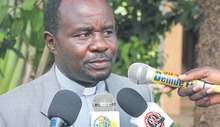Africa: Council of Anglican Provinces
The Council of the Anglican Provinces of Africa (CAPA) was founded in 1979 in Chilema, Malawi, by the Anglican Primates of Africa. It reaches out to individuals, communities and groups through more than 40 million dedicated Church members in the 25 African countries with an Anglican presence. That 40 million is over half the Church-going Anglicans in the world.

CAPA is headed by a council to run the Provinces’ activities. Its secretariat, headed by General Secretary Canon Grace Kaiso from Uganda, is based in Nairobi, Kenya.
CAPA’s Mission is: ‘To effectively coordinate and provide a platform for the Anglican Church in Africa to celebrate life, consult and address challenges in the continent in order to fulfill God’s promise for abundant life.’
Delegations
In 1994, following the genocide, CAPA sent a delegation to visit Rwanda and assist in reorganising the Anglican Churches there.
In 2008 CAPA sent a delegation to South Sudan to investigate how the rest of the Anglican world could assist the Anglican Church as the country moved to independence.
Addressing the twelfth meeting of the CAPA Council in Kigali, Rwanda in August, the Secretary General of the Anglican Communion, Archbishop Josiah Idowu-Fearon said that, after a year in his present role, he had come to appreciate the ‘important and central position’ that Anglican Churches ‘occupy on the world stage’ in the ‘incredible, diverse, beautiful and challenging continent’ of Africa.
‘Through our work, we are the source of the gospel, of education, of democracy, of civil society and political parties; and of the reduction of maternal and child mortality on our continent’, he said. ‘These were not imports from outside. These resulted from the work of our African grandfathers and grandmothers in the faith.
‘They were the village evangelists and cat-echists and schoolteachers and nurses and farmers and labourers and parents who brought to our continent the living Word of God, Jesus, through the written word of God, the Bible, in the power of the Spirit.
‘It was Bible-believing Christians who transformed the face of Africa in the last 150 years and we can transform it again.’
Is it only a matter of time?
He criticised the views expressed by some commentators in the West which sees the Church in Africa as being ‘50 years behind the rest of the world.’
‘They really believe that it will only be a matter of time before we fall in line with their view of the world, of culture, of marriage, of community; either through conviction or, if not, then through convenience.
‘Our African Churches can never be social progressives in the sense beloved of the West. We will never allow our churches to be taken over by views and programmes which suggest that the Bible is wrong. We will not crumble or bow the knee to a godless secular culture that despises the Bible and what it teaches.
‘Actually, our African churches are already progressives. We are seeking to live our lives in accordance with the will of God in the kingdom of God which is the real future for humanity that measures all human progress. And that kingdom is marked here on earth by the priority it gives to the poor in the ministry of the gospel and the concerns of the people of God.
‘We will never allow ourselves, or our identity, or our churches, to be defined by the pride of those who see us as lagging behind them in our economies, our politics, our communities, our families, and our theology.’
Deeply disturbed
Dr Idowu-Fearon said that he was ‘deeply disturbed’ by seeing how Christians determined to maintain Anglican orthodoxy are being ‘swept aside by a campaign to change the Church’s teaching on marriage and so-called rights of equality.’
At this council meeting, Archbishop Stanley Ntagali of Uganda was elected Vice-chairman of the Council. In January he had left the meeting of all Anglican Primates at Canterbury as, he explained, ‘In accordance with the resolution of our Provincial Assembly, it was necessary for me to withdraw from the meeting, which I did at the end of the second day. It seemed that I was being manipulated into participating in a long meeting with the Episcopal Church USA and the Anglican Church of Canada without the necessary discipline being upheld.’ It is notable therefore that Archbishop Stanley has now been elected Vice-chairman of CAPA.
https://www.e-n.org.uk/2016/10/world-news/africa-council-of-anglican-provinces/





